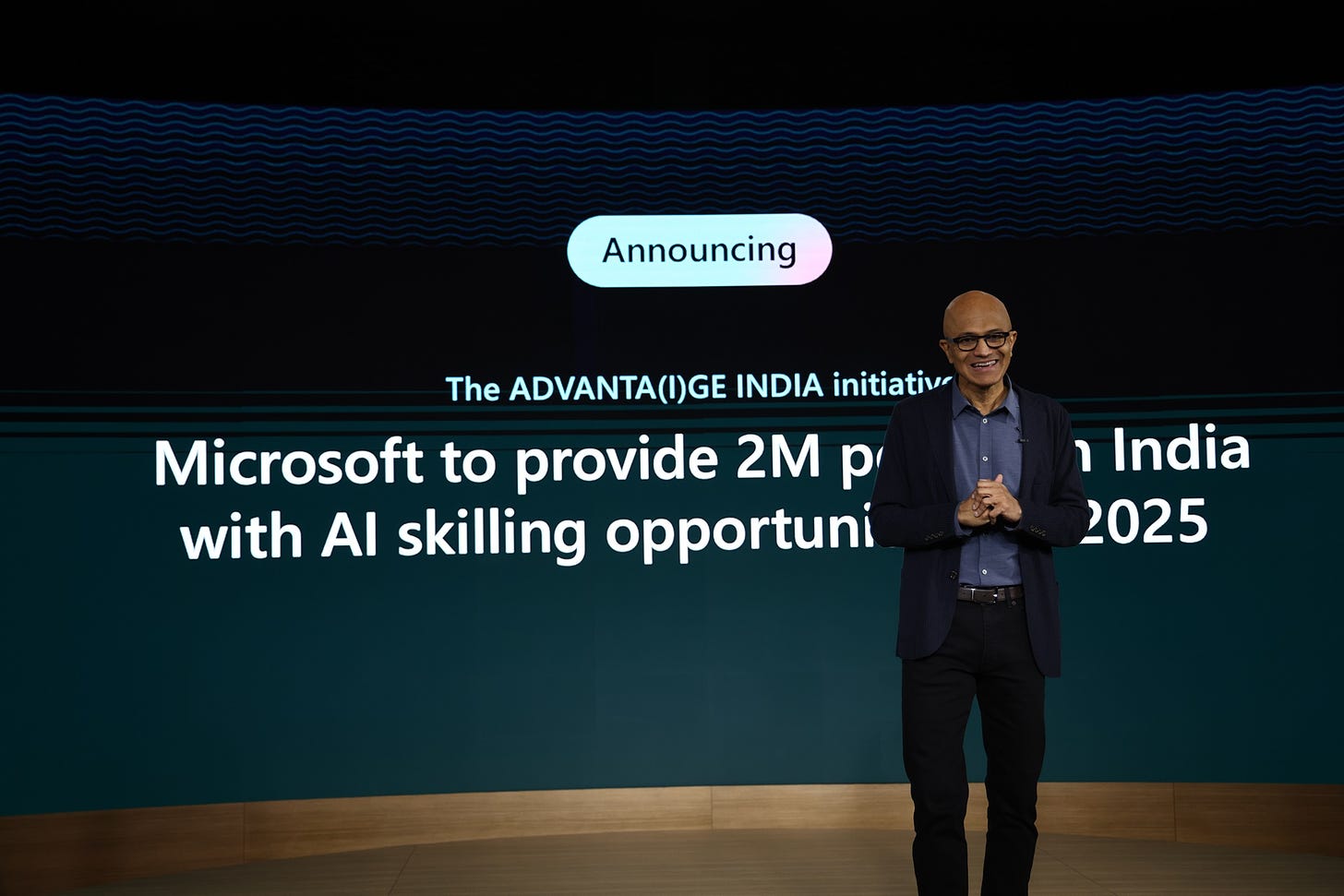
Today’s top AI Highlights:
-
The boundary of neural network trainability is fractal
-
AI-powered smart eyewear for just $350
-
US Bans AI-generated voice robocalls
-
Microsoft to equip 2 million Indians with AI skills by 2025
-
AgentKit by BCG and LangChain, a full-stack starter kit for building constrained agents
& so much more!
Read time: 3 mins
Exploring the depths of neural network training through hyperparameters has unveiled a stunning resemblance between the landscapes of hyperparameter configurations and the complex beauty of fractal patterns. A study conducted over a range of neural network configurations, including deep linear networks and various activation functions, has revealed that the boundary between parameters leading to convergent or divergent training outcomes exhibits a fractal nature, visible across more than ten decades of scale. This insight not only enriches our understanding of neural network behavior but also highlights the intricate balance required in hyperparameter tuning.
Key Highlights:
-
The study meticulously mapped out hyperparameter spaces for neural networks, discovering that the transition zones between effective and ineffective training regimes form fractal patterns. This was consistently observed in every tested neural network configuration, emphasizing the universal presence of fractal boundaries irrespective of the specific hyperparameters being examined, such as learning rates or the mean of parameter initialization distributions.
-
Drawing an analogy to fractal generation, where the iteration of a simple function can lead to complex patterns, the research illustrates how neural network training involves similar iterative processes. The fractal patterns emerge at the bifurcation boundaries within the hyperparameter space, where slight adjustments can lead to dramatically different training outcomes, either converging to a solution or diverging towards failure.
-
The identification of fractal patterns in hyperparameter landscapes underscores the delicacy of optimizing neural networks, as the most effective parameters often lie near the edge of stability. This edge of stability is not only crucial for achieving optimal performance but also poses a significant challenge for tuning, as it requires navigating through fractal-like, sensitive regions of hyperparameter space.
Brilliant Labs has recently introduced the Frame glasses, a $349 smart eyewear solution that brings AI-powered functionalities directly into your line of sight. These glasses not only offer the convenience of displaying visual analysis, translations, and web searches on the lens but also allow users to interact with their surroundings in novel ways, such as identifying landmarks, searching for products, or obtaining nutritional information about food, all through simple voice commands. Set to begin shipping on April 15th, the Frame glasses are equipped with a quirky charging accessory named “Mister Power,” blending convenience and playfulness. (Source)
Key Highlights:
-
Customers can preorder Frame glasses in three color options: black, gray, and clear, with an option to incorporate prescription lenses for an additional cost, bringing the total to $448. This inclusive approach ensures the glasses cater to a diverse audience, balancing advanced technology with user customization and comfort.
-
Featuring a 640 x 400p micro OLED display for a 20-degree field of view, the glasses include a 1280 x 720 camera and microphone, supported by a 222mAh battery. The Lua-based operating system is fully open-source, inviting tech enthusiasts and developers to personalize and innovate, setting Frame apart in the smart eyewear category.
-
Through integration with the Noa app, Frame utilizes OpenAI for visual analysis, Whisper for translation, and Perplexity for web searches. Despite the app being free with a daily usage cap, a paid tier is anticipated.
In the wake of an investigation into AI-generated robocalls that imitated President Joe Biden’s voice to dissuade voters in New Hampshire’s primary last month, the US government has banned robocalls using AI-generated voices. The FCC made a unanimous decision targeting robocalls with AI voice-cloning tools highlighting the misuse of AI voices in robocalls for misinformation, impersonation, and extortion.
Effective immediately, telemarketers are generally banned from using automated dialers or artificial/ prerecorded voice messages to call cellphones without consent, and landline calls require prior written consent. Violators can face fines of up to $23,000 per call. The law also permits legal action by call recipients, with a potential recovery of up to $1,500 per unwanted call. (Source)
Microsoft has announced plans to provide AI skilling opportunities to 2 million people in India by 2025 through its ADVANTA(I)GE INDIA initiative, unveiled by chairman and CEO Satya Nadella in Mumbai. This initiative aims to empower the Indian workforce with future-ready skills in partnership with government, nonprofit, and corporate organizations. It focuses on training individuals in Tier 2 and Tier 3 cities, and rural areas, addressing the skills gap highlighted by Microsoft’s Work Trend Index, which reports that 90% of Indian leaders believe new hires will need AI skills, with 78% of workers feeling underprepared in AI capabilities.
The initiative outlines a comprehensive strategy to create AI fluency across the nation, including training 500,000 students and job seekers including 100,000 young women and 400,000 students in remote schools. Additionally, Microsoft will equip government officers with generative AI knowledge and support nonprofits and NGOs to train 750,000 learners in AI skills, leveraging partnerships with entities like Tata STRIVE and the National Programme for Civil Services Capacity Building to enhance digital governance and promote inclusive socio-economic progress.
-
Augmend: Scale expertise and facilitate knowledge sharing within teams with instant AI-assisted screen recording capabilities. You can capture team processes, tech talks, and more with ease, and utilize features like built-in chat, AI-created highlights, automatic documentation from examples, and copy/pasting from video.
-
AgentKit: A starter kit to build full-stack constrained agent applications, built on the latest versions of Next.js 14, FastAPI and LangChain for optimal performance, security, and developer experience. Developers can use AgentKit as a foundation for their projects to quickly experiment with a constrained agent architecture with a chat UI and scalable backend, and build a full-stack, chat-based agent app that can scale to MVP.
-
NotesGPT: Seamlessly converts your voice notes into organized summaries and clear action items using AI.
-
Nuanced: Detects AI-generated images to help platforms like dating apps, ad platforms, news sites, and marketplaces distinguish between human-authored materials and AI-generated content.
😍 Enjoying so far, TWEET NOW to share with your friends!
-
Does India need its own LLM though? Broad based enough LLMs like ChatGPT or LLaMA, ie ones with enough data, can reason around cultural differences given the correct context . Given that this diversity is possible within any singular LLM itself, I believe it means that countries need LLMs just as much as they need nationalised airlines. ie they don’t.. ~ Rian Darius Pandole
-
NVIDIA will match and overtake Apple soon. The moat of H100, cuda, tensor rt is bigger than iPhone and AppStore. ~ Aravind Srinivas
That’s all for today!
See you tomorrow with more such AI-filled content. Don’t forget to subscribe and give your feedback below 👇
⚡️ Follow me on Twitter @Saboo_Shubham for lightning-fast AI updates and never miss what’s trending!!
PS: I curate this AI newsletter every day for FREE, your support is what keeps me going. If you find value in what you read, share it with your friends by clicking the share button below!


![PzWn42g7QFmnTk__.mp4 [optimize output image] PzWn42g7QFmnTk__.mp4 [optimize output image]](https://substackcdn.com/image/fetch/w_1456,c_limit,f_auto,q_auto:good,fl_lossy/https%3A%2F%2Fsubstack-post-media.s3.amazonaws.com%2Fpublic%2Fimages%2F77679417-d226-4a2a-ab9e-e49095e6c22c_600x600.gif)
![Brilliant Labs Frame.mp4 [optimize output image] Brilliant Labs Frame.mp4 [optimize output image]](https://substackcdn.com/image/fetch/w_1456,c_limit,f_auto,q_auto:good,fl_lossy/https%3A%2F%2Fsubstack-post-media.s3.amazonaws.com%2Fpublic%2Fimages%2F4b3acfa6-4535-4d6b-a678-ac76c48494ee_600x338.gif)

































































































































































































































































































































































































































































